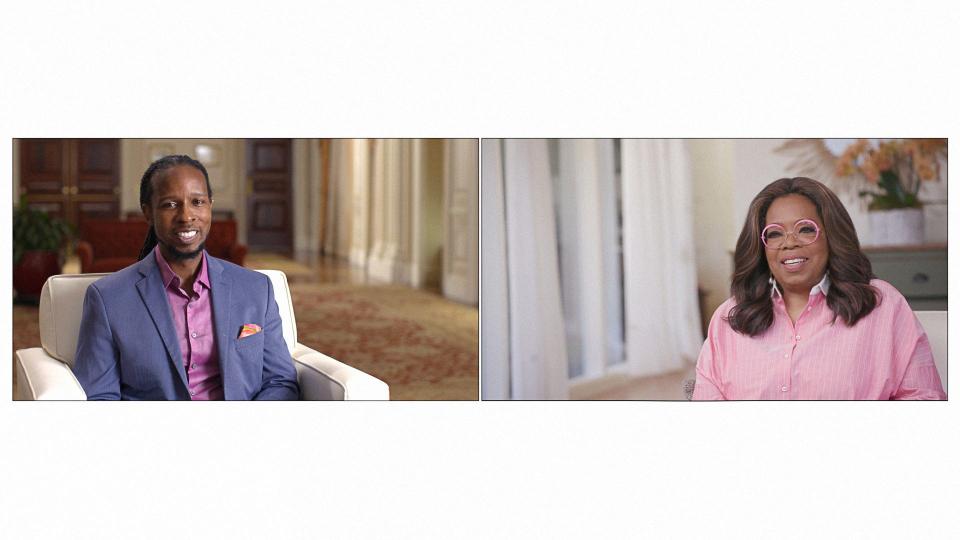Oprah Winfrey discusses racism, Sandra Bland with Ibram X. Kendi: 'That could have been me'
Oprah Winfrey is continuing the conversation about race.
For the third episode of her Apple TV+ series "The Oprah Conversation," the longtime television host brought on author Ibram X. Kendi to discuss his book “How to Be an Antiracist."
Kendi's book landed at No. 3 on USA TODAY’s Best-Selling Books List following the death of George Floyd, a 46-year-old Black man who died May 25 after a Minneapolis police officer knelt on his neck.
During the episode, released Thursday, Winfrey, Kendi and a panel of five people who read the book discussed race relations in America.
At one point, they reacted to footage of Sandra Bland's arrest that surfaced last year.
Bland, a 28-year-old Black woman, was discovered hanging in her jail cell outside Houston days after she was arrested in July 2015. The circumstances leading to her death, which was ruled a suicide, sparked large protests and became a flash point in the debate over the treatment of Black people by police.

In the footage, an officer asks Bland to step out of her car and put out her cigarette. “Get out of the car! I will light you up. Get out!’’ the officer yells when Bland doesn’t comply, pulling out his Taser and pointing it at her.
"If ever somehow we contribute to the escalation, then we’re going to be blamed for what happens to us," Kendi said. "And so, in many ways when I watch that video … in a way I’m watching myself. Because I can remember times in which I’ve de-escalated situations with police officers who were trying to escalate it … and other times I was unsuccessful in doing so."
Winfrey also gave her reaction to the footage, saying "that could have so easily been me."
"I now get to live under this veil of celebrity, so that when I’m stopped or I’m seen, everybody automatically knows who I am. But the days before my name was known throughout many households, that could have been me," she continued. "It was a turn signal. It was a turn signal, and she ends up dead several days later.”
Oprah picks Isabel Wilkerson's 'Caste: The Origins of Our Discontents' for her book club
The group also discussed Amy Cooper, a white woman who called the police on a Black bird-watcher in May.
Kendi said that, in America, people are raised to associate Black people "with danger, with violence, with criminality."
"We are taught to believe that Black neighborhoods are more dangerous and they have higher levels of violent crime, not because they tend to have higher levels of poverty and long-term unemployment, but because there’s so many Black people there," he continued.
According to Winfrey, Cooper is a "great teacher for us in this moment."
"She happens to be here to show us in a way that just talking about it, a lot of people might not have recognized whiteness as a weapon," she said.
Oprah Winfrey announces new interview show, rethinks print for monthly magazine
The group also discussed what to do when someone you know says or does something racist. Kendi said that, in those circumstances, it's important to address why the person committed the racist behavior and to avoid a public "shouting match" with the person.
Winfrey, on the other hand, recalled Maya Angelou's strategy. During one of Angelou's house parties, Winfrey said, the acclaimed writer kicked somebody out by shouting, "Be gone with you," after hearing the person tell a bigoted joke.
“Maya’s theory was always: Words are things, and I don’t want the language, I don’t want the words, in my house," Winfrey recalled. "She would say, 'I don’t want to wake up and find it stuck in my cushions or in my curtains or in the atmosphere, so be gone with you.' "
Oprah Winfrey magazine features Breonna Taylor on the cover, its first without Oprah
This series isn't the only way Winfrey is using her platform to speak out about social issues.
For the first time in 20 years, Winfrey will not be gracing the cover of O, The Oprah Magazine. Instead, Breonna Taylor is featured on the September issue, which is focused on anti-racism and white privilege. Taylor, a 26-year-old EMT, was fatally shot by police officers who entered her Louisville home on March 13 as part of a narcotics investigation.
The issue will be available on newsstands Aug. 11.
'Antiracist Baby' by Ibram X. Kendi to be released as a picture book due to high demand
Contributing: Jenna Ryu, Jorge L. Ortiz
This article originally appeared on USA TODAY: Oprah Winfrey, Ibram X. Kendi discuss Maya Angelou, Amy Cooper, more


